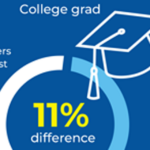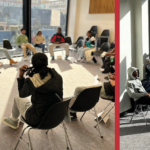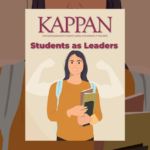📌 We’re back! Today’s newsletter includes some items from previous weeks (and the debut of a new section focused on coverage of school innovations and progress). 📌
Sign up for the newsletter here.
In this week’s newsletter: Most students are now back in school buildings — and things seem to be going well in most places. Education’s role in the midterm elections looks mixed. An infectious diseases expert gives tips on how to report on outbreaks including monkeypox, polio, and COVID. The Associated Press has announced an eight-person education team, which is pretty massive by today’s standards. And the Post and Courier Ed Lab’s Sara Gregory demonstrates her playground-based reporting skills.
SURPRISE SUCCESS
The big story of the week, according to us
All summer we were told all the reasons that schools might not be able to open. But most kids are back in school by now — finally — and things are looking more “normal” than they have in a long time. With a couple of exceptions, most big-city school systems got off to a good start. And, while a handful of districts (and the federal Head Start program) are requiring masks, most have moved on from the COVID safety protocols of the last few years. Surprise!?
🔊 As school starts, teachers add a mental-health check-in to their lesson plans (NPR)
🔊 N.Y.C. Schools Reopen With Focus on Recovery From Pandemic Losses (New York Times)
🔊 First-day attendance at CPS ticks up toward pre-pandemic levels (Chicago Sun-Times) See also Chalkbeat Chicago
🔊 With COVID restrictions behind them, teens relish the high school experience (Mercury News)
🔊 Amid uncertainties, Boston Public Schools reopens doors to new school year (Boston Globe) See also WBUR
🔊 Minnesota students return to class for a new school year (Minneapolis Star Tribune)
Other big stories from the week: Some students are still learning virtually — as a permanent option — but the available data is old. Education is a hot topic of debate as the midterms approach — and is featured in a new ad from Florida Gov. Ron DeSantis. But it may not be a decisive issue. Around the country, sex ed has emerged as a core issue in New Jersey. School safety plans are polarizing voters.

STUDENT-LEVEL COVERAGE
The best education journalism of the week, according to us
🏆 BEST: The best story of the week is How federal covid aid trickled down to Xavier’s classroom by Perry Stein in the Washington Post. While most stories on the influx of federal ESSER money have focused on the big picture, in this piece Stein does an incredible job zooming in and examining what the funding looks like for individual schools and students. In the case of 15-year-old Xavier Byrd, a student who under normal circumstances would not have been identified for additional services, the funding has resulted in extra tutoring — online and in person — and a new robotics club. Some of the school’s efforts work for Xavier. Others fall flat. But Xavier makes strides and is now a junior with a strong interest in robotics. For all those writing about ESSER funds, look to this story for inspiration.
See also: Facing pandemic learning crisis, districts spend relief funds at a snail’s pace in The 74 and This Superintendent’s Tiny, Rural District Got No COVID Aid. Here’s Why That Hurts in EdWeek
🏆 RUNNER-UP: This week’s runner-up is Some California Schools Skimped On Air Conditioning For Years. This Heat Wave Is Just The Beginning Of Their Problems by Kyle Stokes in LAist. Amid the heat wave gripping the West Coast and other parts of the country, Stokes comes out with the story we all need, scrutinizing LAUSD’s air-conditioning policies and whether they are spending ESSER funds on new HVAC systems. While LAUSD requires all classrooms to have air conditioning, about 6% of schools in the district were making calls about problems with their systems on one hot day this week. And while classrooms may be cooler, school kitchens and cafeterias are not. Temps rose to above 120 degrees in one kitchen, Stokes reports. What sets apart his story most is that he also looks down the long road of climate change and how heat waves like this will continue to impact students, rather than reporting it as a one-off news story. As calls grow for greater climate change coverage on the education beat, Stokes shows us how it’s done.
See also: Some Colorado schools cancel class amid high heat forecast in Chalkbeat Colorado
BONUS STORIES:
🏆 D.C. math, reading test scores fall to lowest levels in more than 5 years (Washington Post)
🏆 At Head Start, Masks Remain On, Despite C.D.C. Guidelines (New York Times)
🏆 Daring to Speak Up About Race in a Divided School District (New York Times)
🏆 More kids are repeating a grade. Is it good for them? (AP)
🏆 California does little to ensure all kids read by third grade (EdSource)
🏆 Trust in teachers is plunging amid a culture war in education (Washington Post)
🏆 Fault Lines (The Atavist)

CAREFUL OUTBREAK COVERAGE
New commentary from The Grade
Monkeypox, polio, COVID variants? Education reporters are health reporters now, whether they want to be or not.
In this week’s new column, medical expert Tim Lahey shares some great ideas for reporters called on to cover school-related outbreaks — chief among them describing risks in context and finding the “reasonable middle” where most experts agree rather than focusing on the controversial edges. “Getting it right matters,” writes Lahey.
Also: Check out our latest piece about covering students in foster care, a vulnerable group whose numbers are growing. In Nonprofit New York, The Grade contributor Colleen Connolly shares six things education reporters should know about these students, including perhaps most importantly “making sure not to stereotype them as doomed to failure.”
Follow @alexanderrusso for thought-provoking commentary on education journalism all day, every day.

THE END OF “VIBES-BASED” READING
Promising innovations & signs of progress
💡 After decades of “vibes-based” reading instruction, New York City and other major districts are helping kids learn letters and sounds.
💡 In one Minnesota district, teachers are working to protect Black and brown teachers from seniority-based layoffs.
💡 A group of high poverty schools in Texas is defying the trend and earning high accountability ratings in the state.
💡 Dual enrollment programs are being retooled to work better for lower-income students.
💡 A school in Oakland where nearly a quarter of the students are Indigenous Guatemalan immigrants and English language learners has figured out how to leverage state funding for student mental health.
💡 In Missouri, student test scores are improving, but they’re not quite at pre-pandemic levels yet.
💡 There’s a new AP course in African American studies rolling out this year.
More about the importance of including promising innovations and preliminary successes in education coverage.

PEOPLE, JOBS
Who’s doing what, going where
Above: Forget “✨ some professional news ✨ .” AP’s Cheyanne Mumphrey wins for best new job announcement.
🔥 Career moves: Cheyanne Mumphrey is the newest member of the AP’s new education team, where she’ll be a reporter based in Phoenix. Section editor Chrissie Thompson predicts Mumprhey will be “a force on the education beat” (no pressure!) and describes the rest of the eight-person team, a mix of internal and external hires. Troy Closson is the new NYC education reporter for the New York Times, according to editor Sarah Garland.
🔥 More moves: Caitlynn Peetz is leaving the Bethesda Beat for Education Week, where she’ll report on school district leadership. Houston Chronicle education reporter Alejandro Serrano is leaving to join the Texas Tribune as a general assignment reporter. WNPR investigative reporter — and frequent education reporter — Jacqueline Rabe Thomas is moving to Hearst CT to continue her work. Libby Stanford is EdWeek’s new policy and politics reporter.
🔥 Awards: Big congrats to ONA award finalists including The 74, KPCC Los Angeles, The Texas Tribune, and former education journalist and Spencer fellow S. Mitra Kalita (who received ONA’s 2022 Impact Award). See the full list of finalists here. Great job, everyone!
🔥 Job opportunities: The Christian Science Monitor is hiring a remote education reporter, and outgoing reporter Chelsea Sheasley “can’t say enough good things about the opportunities and support the Monitor offers.” The San Antonio Report is hiring an education reporter. The Hill is hiring an education reporter. The Atlanta Journal-Constitution is hiring a higher education reporter. And The Bell is looking for an intern for their “Miseducation” podcast.
🔥 Breakout! Former NPR education reporter Anya Kamenetz has broken out of the education bubble with her new book “The Stolen Year,” which has been reviewed by the Washington Post and the New York Times among other places. She’s been on NPR’s Morning Edition, the PBS NewsHour, and WBUR’s On Point. She’s also placed op-eds in the Washington Post and the New York Times — not just once but twice.

EVENTS, RESOURCES
Above: EdPost has a new podcast out from former WNYC journalist Tanzina Vega about why so many Black, Latino, and Indigenous kids go to under-resourced schools.
⏰ Appearances & segments: KPCC’s Kyle Stokes was on NPR’s All Things Considered to talk about the heat wave affecting LAUSD schools. The New York Times’ “The Daily” interviewed Jack Healy about the lives of Parkland students four years after the massacre. The Miami Herald’s Sommer Brugal was on Slate’s “What Next” podcast talking about education issues in Florida. AL.com Ed Lab editor Ruth Serven Smith shared how Report for America has helped them transform their coverage. The NYT’s Lulu Garcia-Navarro interviewed three parents about becoming school activists.
⏰ Coming soon: The Hechinger Report is hosting a live Twitter discussion about how schools discriminate against pregnant and parenting students and limit their access to education. “Sold a Story” is the new podcast series coming next month from APM Reports about how teaching kids to read went wrong. Coming in November, Sam Redtail Anderson looks into the arrest of a former high school classmate accused of murder (see the Vulture write-up here).
⏰ Research: Marguerite Roza of the Edunomics Lab shared a fascinating graph showing Seattle Public Schools adding staff over the years, while enrollment shrinks. It would be a great story for reporters to dig into in any district. A recent Gallup poll shows that parents’ fears over their children’s safety at school is the highest it’s been since 2001. New research from CRPE is out on student achievement gaps and the pandemic. Ballotpedia has a new report on school boards and school board races. A group of educators, researchers, and advocacy orgs are hoping to start a broad movement to bring more awareness and resources to newcomer students.
⏰ Resources: Popular Information’s Judd Legum explains how politicians manipulate the media with outrageous claims. (Don’t fall for it!) Denise-Marie Ordway of The Journalist’s Resource interviewed Washington Post reporter Danielle Douglas-Gabriel on how to better cover student loan forgiveness. More kids are repeating a grade, reports AP, whose members can apparently access district and state-level data for their own stories. The Baltimore Banner’s Kristen Griffith describes how to cover after-school programs for EWA (and shares some inspiring first-day videos).
THE KICKER

“Education reporting in one photo.”
Post and Courier Ed Lab reporter Sara Gregory takes on-the-(play)ground reporting to a new level.
That’s all, folks. Thanks for reading!
Reply to this email to send us questions, comments or tips. Know someone else who should be reading Best of the Week? Send them this link to sign up.
Using Feedly or FlipBoard or any other kind of news reader? You can subscribe to The Grade’s “feed” by plugging in this web address: http://www.kappanonline.org/category/the-grade/feed/.
Read more about The Grade here. You can read all the back issues of The Grade’s newsletter, Best of the Week, here.
By Alexander Russo with additional writing from Colleen Connolly.
ABOUT THE AUTHOR

Alexander Russo
Alexander Russo is founder and editor of The Grade, an award-winning effort to help improve media coverage of education issues. He’s also a Spencer Education Journalism Fellowship winner and a book author. You can reach him at @alexanderrusso.
Visit their website at: https://the-grade.org/














